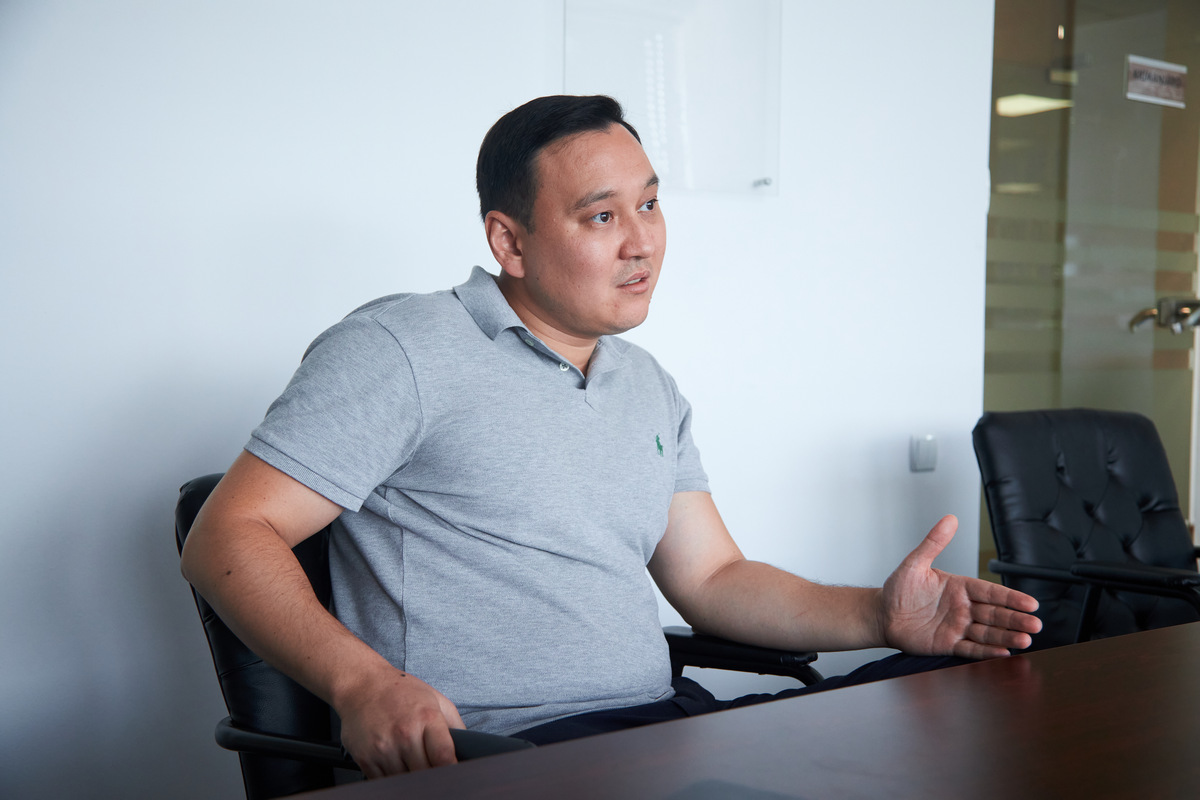«Countless individuals in our country rely on each paycheck with no savings». Entrepreneur from Kazakhstan introduces service enabling workers to access salary advances anytime

Up until the previous year, Beibut Zhanturin enjoyed a prosperous finance career. Following his graduation from the Kazakhstan Institute of Management, Economics, and Strategic Research (KIMEP), he embarked on a journey to the University of Exeter in the UK, where he earned his Master's degree in Finance and Investments. Following this accomplishment, he held positions across different banks and at BV Management (a subsidiary of Qazaqstan Investment Corporation). This organization oversaw a pair of funds amounting to a total of $150 million, and Beibut functioned as its General Director.
Nevertheless, at 35 years old, he made the decision to venture independently and initiated the ProsperPay platform. This service allows employees to monitor their real-time earnings and transfer them onto their bank cards whenever needed. Participating in the collaborative effort between Digital Business and Astana Hub known as "100 Startup Stories of Kazakhstan," Beibut explained the motives behind his shift from a thriving corporate career to a startup, elucidated the mechanics of the salary advance service, and outlined its benefits for employers.
«Considering IT was a suggestion brought up by my wife»
– You were making significant strides along your career path, progressing from a bank manager to the general director at BV Management in just four years. Why did you choose to depart from that and initiate your own business?
– This was a natural progression. I gained extensive knowledge and valuable experience during my tenure at various banks and companies. Translating this into business, harnessing my potential to create something meaningful for society, was my driving force for leaving employment. Moreover, I was confident that the timing for such a transition was optimal.
– What led you to opt for IT instead of a more traditional field?

– My wife's guidance played a crucial role. She had been immersed in researching Kazakhstan's IT landscape for several years, familiar with venture funds, local startups, their operating markets, and their pivots. She shared various cases of both local and international projects, giving me insight into this technological realm. Her influence prompted me to delve into this expertise, and I realized its potential.
Together with Ainur, we embarked on understanding the popular global IT solutions. From an initial list of 50 projects, we distilled it down to 10. Eventually, we settled on fintech. It's a rapidly advancing field with ever-evolving solutions aimed at enhancing people's lives, and I already had experience in this domain. This is how the concept of ProsperPay came into being.
– What did you begin with to actualize the project?
– I initiated the process by reviewing tax and other legal prerequisites. Seeking guidance in this domain, I approached my university friend Eric, who operates a company specializing in accounting system outsourcing. His insights encompassed salary disbursement, utilization of software like 1C, and other related aspects. Our discussions extended over a span of one day, then two, and eventually three. At that juncture, the decision to forge a partnership and jointly establish a startup emerged.

With the plan outlined in written form, we approached several potential corporate clients. We engaged in conversations concerning their potential interest in such a service. Upon receiving feedback and detecting a willingness to collaborate, we proceeded to identify developers and commence preparations for the MVP.
– What is ProsperPay?
– For users, ProsperPay functions as a mobile application that empowers workers to promptly request advance salary payments based on their current earnings, eliminating the need to await the regular salary payment date.
Employers simply need to authorize the integration of our software with their accounting systems. This facilitates the provision of real-time earnings information to employees. If a worker chooses to transfer a portion of their earnings to their bank card as an advance salary, the transaction will be visible on the accountant's records.
«Our service has the potential to cut staff turnover in half»
– Who constitutes the main user of the service?
– The primary users are individuals in production and linear roles, typically those with moderate salaries. In Kazakhstan, a substantial 75% of the population relies on each paycheck without saving. Additionally, about 20% of the employable citizens, equivalent to 1.5 million people, are borrowers from microfinance organizations (MFOs). Nearly one third of them accumulate debt due to the inability to await employer payments. Regrettably, this demographic is on the rise. Over the last four years, the count of overdue payments to MFOs has surged multiple times.
– Hence, what solution do you offer for individuals in this situation?
– An alternative to borrowing, ProsperPay essentially empowers individuals to access their own earnings. The process operates as follows: suppose a worker has completed 15 days of work during a specific period and has earned 150,000 tenge. Should they require funds, they can access their account, input the desired amount, and have it swiftly transferred to their bank card within minutes.

This significantly streamlines life. Workers are no longer required to approach their supervisors, elucidate their circumstances, submit requests, and await approval, which is often time-consuming. Moreover, this alleviates the burden on accountants, who would otherwise have to carry out intricate calculations and arrange for payments—a process known for its time-consuming nature.
– Is it your service that provides the funds to the worker?
– Exactly. An individual submits a request, and we facilitate a money transfer. The sum must not exceed the current earnings at the time of the transaction. Subsequently, when the employer disburses the worker's salary, the owed amount is transferred to us, as the accountant systematically logs all these financial transactions in the record.
– With your integration request for their accounting systems in mind, what motivates employers to engage in cooperation with ProsperPay?
– To begin with, we can be regarded as supplementary social benefits akin to medical insurance and other perks, which holds considerable value for employees. In Western countries, companies offering similar services witness a notable surge in job applications.
Furthermore, we can contribute to the reduction of employee turnover. In Kazakhstan, the turnover rate among linear staff poses a significant challenge. Major employers in the country, among those we've conversed with, have reported a complete staff turnover within a year. In Europe and the US, services akin to ProsperPay have effectively halved staff turnover rates.

Lastly, numerous employers in Kazakhstan recognize this issue firsthand, yet automating the process of providing advance salary payments on-the-go remains intricate. This undertaking demands substantial financial investment and human resources. We provide a functional tool that can seamlessly integrate with various solutions. Best of all, it comes at no cost.
«Today, our service is utilized by 11 companies, collectively employing a total of 20,000 personnel»
– Who comprises your clientele?
– In reference to an ideal client, we are referring to companies with a headcount exceeding 500 that employ an accounting system and administer official salaries.
At present, our service is engaged by 11 companies, collectively responsible for a workforce of 20,000 employees. These businesses encompass prominent retailers, a cleaning holding, an outstaff company, fitness clubs, and production enterprises. Their primary classification is within the B2B sector. Geographically, they are situated in Almaty, Astana, and the Almaty region.
Negotiations are also underway with entities in the quasi-state sector. Contracts are being discussed with several large companies. Future plans also encompass collaborations with the B2G sector, although resource limitations have hindered progress in this area thus far.
Upcoming efforts will focus on expanding to various regions. Our intention is to establish a presence in Shymkent, Karaganda, and Aktobe. Ultimately, our aspiration is to elevate this salary payment methodology to the status of an industry standard and commonplace practice within Kazakhstan.
– Currently, you do not impose any fees on employers. What serves as your avenue for monetization?
– Employees are subject to a fixed commission for each transaction. Notably, there has been a consistent surge in the volume of such transactions every month. In June, the transaction count was fivefold compared to May, and this trend continued in July with a twofold increase over June.
This remarkable progress can be attributed to the Silkway Accelerator by Astana Hub and Google for Startups, as well as our participation in the Investment Readiness Accelerator by Most Hub. These initiatives equipped us with valuable insights into productivity, leading me to generate and assess more hypotheses. Consequently, throughout the duration of the accelerator program, we achieved an impressive eightfold surge in both user numbers and revenue.

– Is the service utilized by all employees within the companies you collaborate with?
– Around 30-50%. These are quite promising statistics. Upon analyzing the conversion rates of international counterparts, it's evident that their numbers are notably lower. Upon the inception of ProsperPay, I anticipated a more enthusiastic adoption of such a solution among the population in Kazakhstan. Given that our citizens have comparatively lesser financial means than those in Western Europe and the USA.
«As demonstrated by the track record of services akin to ours, the need for on-demand salary advances won't become obsolete for everyone simultaneously»
– What constitutes the project's source of revenue?
– For an extended period, ProsperPay was exclusively funded using my and Eric's resources. We also acquired investments in the form of a loan to amplify turnover for advancing payment financing.
At present, we are engaged in developing a new funding round from a business angel, anticipated to be valued at $3 million. These funds will be allocated to product development, with plans to introduce fresh features. We are currently in dialogue with our clients to ascertain their primary areas of interest. Furthermore, we will proactively allocate resources towards marketing efforts, a facet that was previously unexplored. The management of promotions and sales was independently undertaken by us.
– Let's engage in a bit of speculation. If over the next few years the standard of living and wages in Kazakhstan witness an increase, will your service still retain its relevance?
– As evidenced by the history of services similar to ours, the requirement for immediate salary advances won't universally become outdated all at once. In countries like Great Britain and the USA, where the standard of living and wages significantly surpass those in Kazakhstan, such solutions remain popular.
Indeed, while the user base might be smaller, there are consistently individuals who find value in these services. Furthermore, this convenient digital tool allows users to monitor their daily earnings and access funds whenever needed. As a result, the service will maintain its relevance not only in Kazakhstan but also in other countries.
– Am I perceiving correctly that you have plans to undertake scaling efforts?
– We do indeed have such intentions. Initially, our focus will be on entering additional markets within Central Asia. We are particularly interested in the Uzbekistan market, which boasts a larger population than Kazakhstan, numerous production enterprises, and a lower income level among its residents.
Subsequently, our trajectory will extend to South Eastern Asia. This densely populated region faces challenges akin to ours, yet it boasts advanced technologies and a robust digital infrastructure. This presents ample opportunities for substantial growth.
However, our scaling endeavors are scheduled for no earlier than 2024. At present, our concentration remains directed towards Kazakhstan. It's imperative that we establish a strong foundation before venturing into new markets.


